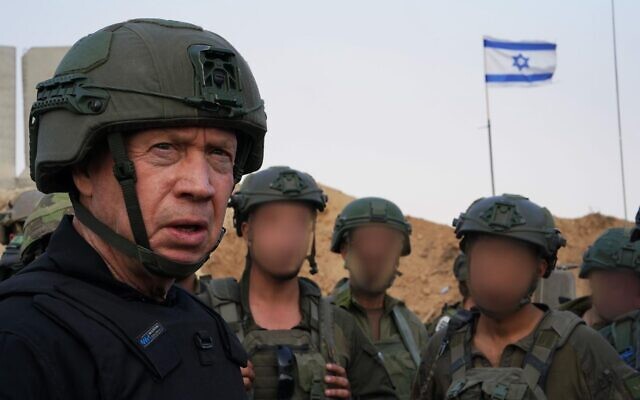



Visiting the Lebanon border city of Kiryat Shmona, Prime Minister Benjamin Netanyahu told IDF reservists on Monday that Israel wants to restore security in the area without going to war with Hezbollah, but is ready for an escalation if necessary.
“Hezbollah got us wrong in a major way in 2006, and is getting us seriously wrong even now,” he told soldiers from the 769th Regional Brigade, referring to the inconclusive 34-day conflict fought between Israel and the powerful Shiite terror group.
“Hezbollah made a big mistake with us in 2006 and it is making one now,” Netanyahu continued. “It thought that we were like a spiderweb.”
Before the 2006 war, Hezbollah leader Hassan Nasrallah referred to an ostensibly soft, weak Israeli society as a spiderweb.
He returned to the metaphor in a November address: “Israel has revealed itself to be a weak state, as fragile as a spiderweb, and it needs American and Western support.”
Netanyahu told the soldiers that Hezbollah knows that this characterization is a fiction.
“It sees here tremendous power, the unity of a people, a determination to do whatever is necessary to restore security to the north, and I tell you – this is my policy,” he continued.
Netanyahu spoke to the soldiers hours after a Hezbollah anti-tank missile hit the city.
“We will do everything to restore security to the north and allow your families –because many of you are from here – to return home in safety and to know that we are not to be trifled with,” he pledged. “We will do whatever is necessary.”
“Of course, we prefer that this be done without a widespread campaign, but that will not stop us,” said the prime minister. “We gave them an example of what is happening to their friends in the south; this is what will happen here in the north. We will do everything to restore security.”
The prime minister was accompanied by Economy Minister Nir Barkat, his Chief of Staff Tzachi Braverman and his Military Secretary General Avi Gil.
As Netanyahu was on the Israel-Lebanon border, news emerged of a fatal strike on a senior commander in Hezbollah’s elite Radwan force.
Lebanese sources called the apparent Israeli strike a “painful” blow for the terror group.
Security sources identified the Hezbollah commander as Wissam al-Tawil, the deputy head of a unit within the Radwan force. They said he and another Hezbollah fighter were killed when their car was hit in a strike on the Lebanese village of Majdal Selm.
“This is a very painful strike,” one of the security sources told Reuters. Another said, “Things will flare up now.”
The commander “had a leading role in managing Hezbollah’s operations in the south,” a security official told AFP, requesting anonymity for security concerns, adding he “was killed in an Israeli raid targeting his car in the south” of Lebanon.
On Sunday, Defense Minister Yoav Gallant told the Wall Street Journal that Israel isn’t afraid to go to war with the Iran-backed Hezbollah terror group in Lebanon if push comes to shove.
Defending the need for Israel’s war against Hamas in Gaza, Gallant explained that among other purposes, it will serve to warn Iran and its proxies away from launching similar attacks in the future.
“My basic view: We are fighting an axis, not a single enemy,” he said. “Iran is building up military power around Israel in order to use it.”
Since October 8, Hezbollah and allied Palestinian terror factions in Lebanon have engaged in daily border clashes with Israeli troops, targeting civilian communities with drone, rocket and missile attacks, and forcing tens of thousands of people to evacuate from the area.
The escalating fighting along the border has resulted in four civilian deaths on the Israeli side, as well as the deaths of nine IDF soldiers.
Before Monday’s strike, Hezbollah had named 153 members who have been killed by Israel during the ongoing skirmishes, mostly in Lebanon but some also in Syria. In Lebanon, another 19 operatives from other terror groups, a Lebanese soldier, and at least 19 civilians, three of whom were journalists, have been killed.
The alleged Israeli killing of Hamas terror chief Saleh al-Arouri in the Lebanese capital of Beirut last week sparked further fears of broader conflagration, as he was the most high-profile figure to be killed since October 7 and because his death came in the first strike on the Lebanese capital since hostilities started.




